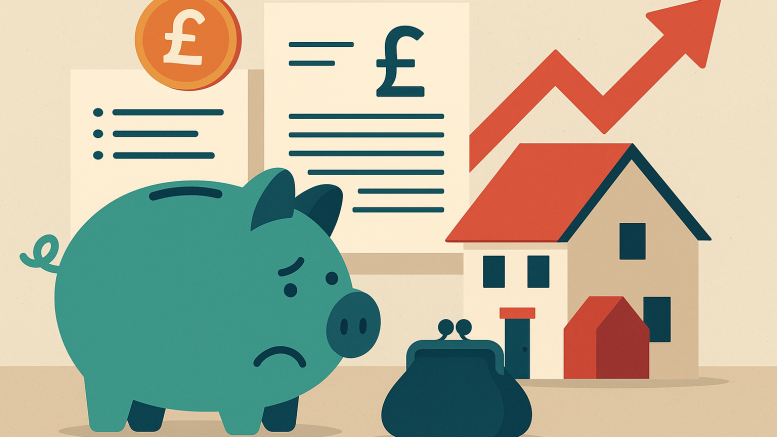Landlords may be watching rental income rise-but tenants are struggling to keep up. New data shows just 17% of UK renters are currently saving for a deposit, the lowest figure in six months, as rising rents, falling confidence and squeezed wages push homeownership further out of reach.
Renters squeezed as rent outpaces income growth
Barclays’ latest Property Insights report reveals a 5.2% year-on-year jump in consumer spending on rent and mortgages during July-the steepest rise since February. Utility costs also crept up 2.7%, compounding the pressure on renters’ household budgets.
More than six in 10 renters (62%) say their rent has recently gone up or will soon increase, leaving little room to save. Deposit saving has plummeted: just 17% of renters were actively saving in July, down from 31% in January. It’s a sharp drop that coincides with rising pessimism about housing prospects.
“Many people dream to one day own a home, but our latest findings highlight how renters are finding it ever harder to save for a deposit while keeping up with rising costs,” said Jatin Patel, Head of Mortgages at Barclays.
Renters now spend nearly a third (30.8%) of their take-home pay on housing, while homeowners allocate just 26.6% to their mortgages-yet typically earn much more (£37,775 vs £23,562). And with rate cuts slow to materialise and house prices still stubbornly high, many renters simply don’t see a route onto the ladder.
Landlords benefit-but buyer pipeline thins
From a landlord perspective, the shift could sustain rental demand well into 2026. As more renters abandon hopes of homeownership, long-term tenancies become more common-particularly in regions where affordability gaps are widest.
Still, the data may give some pause. Confidence in the UK housing market slipped again in July, down to just 26%. Only 12% of renters now believe they could buy within a year, while 28% say they’re no longer interested in owning at all-the highest figure recorded this year.
Letting agent Tom Ingram, based in Nottingham, told us: “Tenants who were keen to buy five years ago are now renewing again and again. It’s not that they’ve lost the dream-they’ve just lost faith in the system.”
From a lettings perspective, this entrenches demand-but it may also lead to policy pressure, especially as political parties eye housing reform ahead of the next election. Landlords benefiting from high rents may face scrutiny for perceived ‘rentflation’, despite their own cost pressures and compliance burdens.
Rent or own? For many, the numbers no longer add up
Interestingly, more than half of UK adults (55%) believe renting is more expensive than paying a mortgage-rising to 61% among homeowners. Yet just 42% of renters feel the same, likely due to the wider income gap and limited mortgage access.
This misalignment also shows up in behaviour. While nearly half of would-be buyers (45%) say they’d rather wait and save a larger deposit to reduce mortgage payments, only 12% would accept higher borrowing costs to get on the ladder sooner. A third (34%) would downsize to a smaller property if it meant lower borrowing.
Barclays’ Patel noted: “We’re still seeing savers create strong habits, and carefully consider the trade-offs between deposit size and affordability. Our new tools like Mortgage Boost and Family Springboard are designed to help where family support is possible, even without an upfront gift.”
Yet even creative solutions may not be enough to reverse the mood. Confidence is now the key barrier, as Will Hobbs, Managing Director at Barclays Private Bank, explained: “The UK economy remains in a better place than the public debate suggests. But unlocking pent-up spending power depends on confidence-and that’s fragile right now.”
For landlords, the message is mixed. Demand is holding strong and rental yields remain supported-but the pipeline of first-time buyers is weakening. As rent inflation eats into renter confidence and deposit saving habits wane, will the long-term shift towards renting reshape the market for good-or is this just a pause before recovery resumes?








